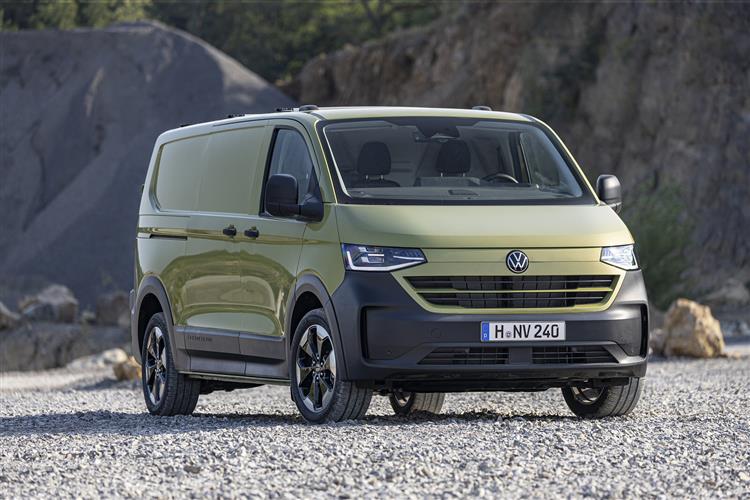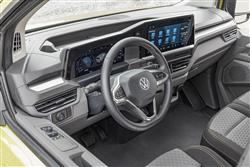TRANSPORT OF DELIGHT? (some text hidden) --NONE--
By Jonathan Crouch
Volkswagen has revitalised its long-running Transporter mid-sized van, courtesy of a little help from rivals Ford. Jonathan Crouch takes a look.
Ten Second Reviewword count: 56
Everything about Volkswagen seventh generation Transporter van is different - but much is also the same. The tough build, interior quality, torquey diesel engines and strong residuals of this mid-sized LCV will all be recognisable to existing owners. Who'll be intrigued by the new PHEV and EV powertrains that shared development with Ford has made possible.
Backgroundword count: 376
Think of a Volkswagen van and it's quite probable that you'll be picturing this one, the Transporter. It is, after all, the brand's best selling commercial vehicle, with a production run that stretches back to 1950. Here, we've the seventh generation T7 version, a van significantly improved in many of the areas that really matter. The Transporter story dates right back to Germany's bleak post-war era and 1949 when a Dutch vehicle importer called Ben Pon spotted workers at Volkswagen's Wolfsburg factory using a stripped-down Beetle to move parts around. Inspired, he sketched out a platform for a versatile commercial vehicle that would go on to set a template for the kind of spacious modern van we're familiar with today. That T1 Transporter sold for 17 years before a more spacious T2 model was introduced in 1967, followed by a more angular T3 version in 1979. More familiar on modern roads are the T4 design of 1990, its replacement T5 successor of 2003 and this modern Transporter's direct predecessor, the T6, which sold between 2015 and 2024. All of these Transporter models were aimed at the same medium-sized van segment that this one targets - right in the heart of the commercial vehicle sector. Business people shopping here need something more spacious than a compact LCV like Volkswagen's own Caddy, but they don't want to stretch to the higher running costs of a really large van. It's an ultra-competitive segment thoroughly dominated in our market by the model this seventh generation Transporter now shares all its engineering with, Ford's Transit Custom. Thanks to the 'Project Cyclone' agreement between the two companies, every modern era Ford and VW LCV is now a shared design and Ford led the development of this one, as they did with the Ranger/Amarok pick-up. Volkswagen's worked hard though, to give this Transporter its own identity and has slotted it into its 'Bulli' commercial vehicle range alongside the ID.Buzz Cargo EV and the Multivan MPV, which now forms a basis for the brand's successful California camper. Previous Transporter models have usually been seen as a 'quality' choice in this segment; can this Ford-engineered MK7 version follow suit? What impact will the new PHEV and EV derivatives have? And just how 'Volkswagen' is it?
Engines and Tech Specword count: 269
A major oversight with the design of the previous T6 generation Transporter was not to allow for any kind of electrification. Contrast that with what's on offer here; a choice of EV powertrains (including the most powerful one in the segment). Plus another Transporter first; a PHEV engine. The only other model in the segment to offer that is this VW's Ford Transit Custom cousin. Of course you can still have a conventional diesel too, which is essential because that's what most operators will want for quite a few years yet. There's a choice of three 2.0 TDI units offering 110PS, 150PS (with an optional DSG auto) and 170PS (which is auto-only). Avoid the base unit and there's the option of 4MOTION 4WD. If you're prepared to step into the brave new world of electrification with your Transporter, it will of course be 2WD and auto transmission only. The eHybrid PHEV offers the highest power output in the range - 232PS - courtesy of a 2.5-litre turbocharged petrol engine paired with an electric motor. There are two versions of the full-EV model, offering either 136PS or 218PS. Both use a single electric motor to drive the rear wheels and are powered by a 64kWh battery that should give you around 200 miles of range from a full charge. Later in production, there may also be less powerful EV variant with a smaller battery, aimed companies merely needing their e-Transporter for urban deliveries. One drawback of the electrified models lies with the slightly lower braked towing weight - which has been increased on the diesel version, up to 2.8 tonnes.
To see the full road test text contact us on 0330 0020 227
Pictures (high res disabled)

.jpg)
|
.jpg)
|
.jpg)
| |||
.jpg)
|
.jpg)
|

|
Statistics (subset of data only)
Min |
Max |
|
Price: |
£30,995.00 (At 4 Dec 2024) |
£45,015.00 (At 4 Dec 2024) |
Max Speed (mph): |
111 (150PS TDI) |
|
0-62 mph (s): |
10.5 (150PS TDI) |
|
Combined Mpg: |
43 (150PS TDI) |
|
Length (mm): |
5050 |
|
Height (mm): |
1968 |
|
Load Volume (l): |
6 |
9 |
Payload Capacity (l): |
133 |
|
Scoring (subset of scores)
Category: Vans
| Performance | |
| Handling | |
| Comfort | |
| Space | |
| Styling, Build, Value, Equipment, Depreciation, Handling, Insurance and Total scores are available with our full data feed. | |



